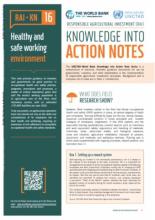Land Library
Bienvenue dans la bibliothèque du Land Portal. Explorez notre vaste collection de ressources en libre accès (plus de 74 000), comprenant des rapports, des articles scientifiques, des articles de recherche, des publications évaluées par des pairs, des documents juridiques, des vidéos et bien plus encore.
/ library resources
Showing items 1 through 9 of 4684.Cette note restitue les discussions d’une journée consacrée aux enjeux de sécurisation des systèmes pastoraux et agropastoraux qui a été organisée le 20 novembre 2024 à l’AFD à l’initiative du Comité technique « Foncier & développement » (CTFD).
June 4, 2021 -- An increasing number of countries are facing growing levels of acute food insecurity, reversing years of development gains.
Over the past 30 years, real GDP in Ghana has more than quadrupled, and in 2011 the country joined the ranks of Lower Middle-Income Countries (LMICs).
In May 2019, a complaint was lodged with CAO by members of 22 communities from the Margibi and Bong Counties in Liberia (the “Complainants”), supported by the NGOs Green Advocates International (GAI), Alliance for Rural Democracy (ARD), Natural Resource Women Platform (NRWP), and the Yeagbamah Na
Ethiopia’s rapidly growing urban centers are facing an unprecedented level of demand for urban land
and housing. How can Ethiopia supply urban land in an efficient and equitable fashion to accommodate
This note is part of an Action Notes series and provides guidance for governments and companies on examples to follow to engage youth in participating in agriculture.
The USAID's Investor Survey on Land Rights aimed to provide a more systematic understanding of the drivers of tenure risk to land-based investments from the perspective of the private sector, and of how investors and operators assess, mitigate and are affected by such risks.
This note is part of an Action Notes series and provides guidance for governments and companies on good practice in occupational health and safety policies, programs, procedures and processes, a matter of critical importance given that half the world’s working population is in agriculture








